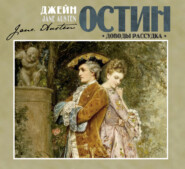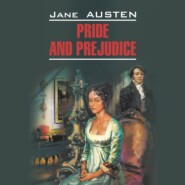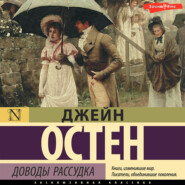По всем вопросам обращайтесь на: info@litportal.ru
(©) 2003-2025.
✖
Pride and Prejudice. Адаптированная книга для чтения на английском языке. Intermediate
Настройки чтения
Размер шрифта
Высота строк
Поля
«Good heavens!» cried Elizabeth. «How could it happen that his will was ignored? Why didn't you ask for legal help?»
«There was informality in the terms of the will which didn't give me any hope to get help from law. Mr. Darcy chose to treat it as just a conditional recommendation, and to say that I had lost all privilege to it by extravagance, imprudence, in short anything or nothing. The living became vacant two years ago and was given to another man. I haven't done anything impertinent or imprudent to deserve to lose it. Perhaps, having a warm, unguarded temper, I had spoken my opinion of him, and to him, too freely. I can remember nothing worse. But the fact is, that we are very different sort of men, and that he hates me».
«This is quite shocking! He deserves to be publicly disgraced».
«Some time or other he will be, but I cannot forget his father, so I can never expose him».
Elizabeth thought him to be a very honourable man and even handsomer than ever.
«But what», asked she, after a pause, «can have been his reason for such cruelty?»
«A deep dislike of me born by jealousy. His father's unusual affection for me irritated him, I think, very early in life. He could not stand the sort of preference which was often given me».
Elizabeth was shocked by such injustice, such inhumanity on the part of Mr. Darcy.
After a few minutes' silence she said, «I remember his saying one day, at Netherfield, that he is consistent in his resentments, has an unforgiving temper. His character must be dreadful».
Wickham said he couldn't be just in his judgment of Darcy's character.
Elizabeth was again deep in thought, and after a time exclaimed, «To treat like this his companion from childhood, connected together in the closest manner!»
«The greatest part of our youth was passed together. We lived in the same house, shared the same amusements, were objects of the same parental care. My father devoted all his time to the care of the Pemberley property. He was most deeply respected by Mr. Darcy, a most intimate, trustworthy friend. When, immediately before my father's death, Mr. Darcy gave him a voluntary promise of providing for me, I am convinced that he felt it to be as much a debt of gratitude to him, as of his affection to myself».
«How strange!» cried Elizabeth. «The very pride of this Mr. Darcy should have kept him from being unjust to you! There is no pride in dishonesty, and he treated you dishonestly».
«It is amazing», replied Wickham, «for almost all his actions may be traced to pride; pride had often been his best friend. But we are none of us consistent, and in his behaviour to me there were stronger impulses even than pride».
«Can such detestable pride as his have ever done him good?»
«Yes. It has often led him to be liberal and generous, to give his money freely, to show hospitality, to help his tenants, and support the poor. Family pride and filial pride, for he is very proud of what his father was, have done this. He has also brotherly pride, which, with some brotherly affection, makes him a very kind and careful guardian of his sister. Everybody says he is the most attentive and best of brothers».
«What sort of girl is Miss Darcy?»
He shook his head. «I wish I could call her friendly. It gives me pain to speak badly of a Darcy. But she is too much like her brother: very, very proud. As a child, she was affectionate and pleasing, and extremely fond of me; I have devoted hours and hours to her amusement. But she is nothing to me now. She is a handsome girl, about fifteen or sixteen, and, I understand, highly accomplished. Since her father's death, her home has been London, where a lady lives with her, and supervises her education».
«I am astonished at his intimacy with Mr. Bingley! How can Mr. Bingley, who is good humor itself, be in friendship with such a man? Do you know Mr. Bingley?» Elizabeth asked.
«Not at all».
«He is a friendly, charming man. He cannot know what Mr. Darcy is».
«Probably not, but Mr. Darcy can please where he chooses. He can be a real conversationalist if he thinks it worth his while. Among those who are his equals in social importance, he is a very different man from what he is to the less prosperous. His pride never leaves him; but with the rich he is liberal-minded, just, sincere, honourable, and perhaps pleasant».
The whist party soon afterwards broke up, and the players gathered round the other table. Mr. Collins sat down between his cousin Elizabeth and Mrs. Phillips. Mrs. Phillips asked him about his success at whist. He said he had lost, but asked her not to feel uneasy about it.
«I know very well, madam», said he, «that when persons sit down to a card-table, they must take their chances of these things, and happily my circumstances allow me to lose five shillings without much regret. There are undoubtedly many who could not say the same, but thanks to Lady Catherine de Bourgh, I am far beyond the necessity of paying attention to little matters».
Mr. Wickham got interested, and after watching Mr. Collins for a few moments, he asked Elizabeth in a low voice whether her relative was very intimately acquainted with the family of de Bourgh.
«Lady Catherine de Bourgh», she replied, «has recently given him a living. I don't know how she first noticed Mr. Collins, but he certainly has not known her long».
«You know of course that Lady Catherine de Bourgh and Lady Anne Darcy were sisters; consequently that she is aunt to the present Mr. Darcy».
«No, indeed, I did not. I knew nothing at all of Lady Catherine's connections. I never heard of her existence till the day before yesterday».
«Her daughter, Miss de Bourgh, will have a very large fortune, and it is expected that she and her cousin Mr. Darcy will unite the two estates».
This information made Elizabeth smile, as she thought of poor Miss Bingley. All her attentions, her affection for his sister and her praise of himself must be in vain and useless if he was already destined for another.
«Mr. Collins», said she, «speaks highly both of Lady Catherine and her daughter. But from some details in his stories about her ladyship, I suspect his gratitude misleads him, and that in spite of her being his patroness, she is an arrogant, conceited woman».
«I think she is both in a great degree», replied Wickham. «I have not seen her for many years, but I very well remember that I never liked her, and that her manners were dictatorial and offensive. She has the reputation of being remarkably sensible and clever, but I think she gets this reputation partly from her rank and fortune, partly from her authoritative manner, and the rest from the pride for her nephew, who chooses that everyone connected with him should have an intelligence of the first class».
Elizabeth thought that he had given a very reasonable description of it, and they continued talking together, with mutual satisfaction till supper put an end to cards, and gave the rest of the ladies their share of Mr. Wickham's attentions. There could be no conversation in the noise of Mrs. Phillips's supper party, but his manners recommended him to everybody. Whatever he said, was said well; and whatever he did, done gracefully. Elizabeth went away with her head full of him. She thought of Mr. Wickham and of what he had told her all the way home. But she wasn't able even to mention his name as they went, for neither Lydia nor Mr. Collins were silent for a moment. Lydia talked of lottery tickets, of what she had lost and what she had won; and Mr. Collins described the politeness of Mr. and Mrs. Phillips, repeated again and again that he did not in the least regret his losses at whist, enumerated all the dishes at supper, and had more to say than he could manage before the carriage stopped at Longbourn House.
Chapter 16
The next day, Elizabeth told Jane about her conversation with Mr. Wickham. Jane was astonished and worried; it was difficult for her to believe that Mr. Darcy could be so unworthy of Mr. Bingley's respect; and yet, it was not in her nature to question the honesty of a young man of such pleasant appearance as Wickham.
«They have both», said she, «been deceived, perhaps, in some way or other, of which we can form no idea. Interested people have perhaps misrepresented each to the other. It is, in short, impossible for us to guess the causes or circumstances which had set them against each other, without factual blame on either side».
«Very true, indeed; and now, my dear Jane, what have you got to say about those interested people? Defend them too, or we shall be obliged to think badly of somebody».
«Laugh as much as you choose, but you will not laugh me out of my opinion. My dearest Lizzy, just think in what shameful light it places Mr. Darcy, to be treating his father's favourite in such a manner, one whom his father had promised to provide for. It is impossible. No respectable man, no man who cared for his good reputation, could be capable of it. Can his most intimate friends be so greatly deceived in him? Oh, no!»
«I can much more easily believe that this friendship has been imposed on Mr. Bingley, than that Mr. Wickham has invented such history of himself as he gave me last night; names, facts, everything. If it is not so, let Mr. Darcy contradict it. Besides, there was truth in his looks».
«It is difficult indeed, it is upsetting. One does not know what to think».
«I beg your pardon; one knows exactly what to think».
The sisters were called from the shrubbery, where this conversation passed, by the arrival of the very persons of whom they had been speaking; Mr. Bingley and his sisters came to give their personal invitation for the long-expected ball at Netherfield, which was fixed for the following Tuesday. Mr. Bingley's sisters were delighted to see their dear friend Jane again, called it an age since they had met, and repeatedly asked what she had been doing with herself since their separation. To the rest of the family they paid little attention, avoiding Mrs. Bennet as much as possible, saying not much to Elizabeth, and nothing at all to the others. They soon hurried to leave Longbourn as if eager to escape from Mrs. Bennet's polite exclamations.
The prospect of the Netherfield ball was extremely pleasant to every female of the family. Mrs. Bennet was flattered by receiving the invitation from Mr. Bingley himself, instead of a ceremonious card. Jane pictured to herself a happy evening in the society of her two friends, and the attentions of their brother; and Elizabeth thought with pleasure of dancing a great deal with Mr. Wickham, and of seeing a confirmation of everything in Mr. Darcy's behaviour. Though Catherine and Lydia, like Elizabeth, meant to dance half the evening with Mr. Wickham, he was by no means the only partner who could satisfy them. And even Mary could assure her family that she hadn't anything against a ball.
«While I can have my mornings to myself», said she, «I think it is no sacrifice to join occasionally in evening amusements».
Mr. Collins surprised Elizabeth when he said that he saw nothing improper in his joining in the evening's amusement.
«I am by no means of the opinion, I assure you», said he, «that a ball of this kind, given by a young man of good reputation, to respectable people, can have any evil tendency; I am so far from objecting to dancing myself, that I will hope to be honoured with the hands of all my fair cousins in the course of the evening, and I take this opportunity of asking yours, Miss Elizabeth, for the two first dances especially».
Though Elizabeth hoped to be engaged by Mr. Wickham for those very dances, she saw now that Mr. Wickham's happiness and her own were perforce delayed a little longer, and accepted Mr. Collins's proposal with as good a grace as she could. His gallantry pleased her even less because of the suspicion that she was selected from among her sisters as worthy of being mistress of Hunsford Parsonage. The suspicion soon became conviction, as she noticed his increasing politeness toward herself, and heard his frequent attempt at a compliment on her wit and vivacity. She understood by her mother's behavior that their marriage would please her extremely. Elizabeth, however, did not choose to take the hint. Mr. Collins might never make the offer, and till he did, it was useless to quarrel about him.
Chapter 17
Elizabeth was sure Mr. Wickham would be among the officers at Netherfield ball. She had dressed with more than usual care, and prepared in the highest spirits for the conquest of all that remained unconquered of his heart. But she looked in vain for him among the group of red coats assembled in the drawing room at Netherfield. In an instant arose the suspicion that Mr. Wickham hadn't been included in the Bingleys' invitation to the officers for Mr. Darcy's pleasure. Though this was not exactly the case, his friend Denny confirmed the absolute fact of his absence when Lydia asked him. He told them that Wickham had to go to town on business the day before, and hadn't yet returned, adding, with a meaningful smile, «I do not imagine his business would have called him away just now, if he had not wanted to avoid a certain gentleman here».
On hearing this, Elizabeth felt that Darcy was no less answerable for Wickham's absence than if her first guess had been just, and every feeling of displeasure against Mr. Darcy was so sharpened by her disappointment, that she could hardly reply with tolerable politeness to the well-mannered questions which he soon afterwards approached to make. Attention, patience with Darcy was offence to Wickham. She was determined against any sort of conversation with him, and turned away with a degree of bad temper which she could not wholly win even in speaking to Mr. Bingley, whose blind affection for Darcy irritated her.
«There was informality in the terms of the will which didn't give me any hope to get help from law. Mr. Darcy chose to treat it as just a conditional recommendation, and to say that I had lost all privilege to it by extravagance, imprudence, in short anything or nothing. The living became vacant two years ago and was given to another man. I haven't done anything impertinent or imprudent to deserve to lose it. Perhaps, having a warm, unguarded temper, I had spoken my opinion of him, and to him, too freely. I can remember nothing worse. But the fact is, that we are very different sort of men, and that he hates me».
«This is quite shocking! He deserves to be publicly disgraced».
«Some time or other he will be, but I cannot forget his father, so I can never expose him».
Elizabeth thought him to be a very honourable man and even handsomer than ever.
«But what», asked she, after a pause, «can have been his reason for such cruelty?»
«A deep dislike of me born by jealousy. His father's unusual affection for me irritated him, I think, very early in life. He could not stand the sort of preference which was often given me».
Elizabeth was shocked by such injustice, such inhumanity on the part of Mr. Darcy.
After a few minutes' silence she said, «I remember his saying one day, at Netherfield, that he is consistent in his resentments, has an unforgiving temper. His character must be dreadful».
Wickham said he couldn't be just in his judgment of Darcy's character.
Elizabeth was again deep in thought, and after a time exclaimed, «To treat like this his companion from childhood, connected together in the closest manner!»
«The greatest part of our youth was passed together. We lived in the same house, shared the same amusements, were objects of the same parental care. My father devoted all his time to the care of the Pemberley property. He was most deeply respected by Mr. Darcy, a most intimate, trustworthy friend. When, immediately before my father's death, Mr. Darcy gave him a voluntary promise of providing for me, I am convinced that he felt it to be as much a debt of gratitude to him, as of his affection to myself».
«How strange!» cried Elizabeth. «The very pride of this Mr. Darcy should have kept him from being unjust to you! There is no pride in dishonesty, and he treated you dishonestly».
«It is amazing», replied Wickham, «for almost all his actions may be traced to pride; pride had often been his best friend. But we are none of us consistent, and in his behaviour to me there were stronger impulses even than pride».
«Can such detestable pride as his have ever done him good?»
«Yes. It has often led him to be liberal and generous, to give his money freely, to show hospitality, to help his tenants, and support the poor. Family pride and filial pride, for he is very proud of what his father was, have done this. He has also brotherly pride, which, with some brotherly affection, makes him a very kind and careful guardian of his sister. Everybody says he is the most attentive and best of brothers».
«What sort of girl is Miss Darcy?»
He shook his head. «I wish I could call her friendly. It gives me pain to speak badly of a Darcy. But she is too much like her brother: very, very proud. As a child, she was affectionate and pleasing, and extremely fond of me; I have devoted hours and hours to her amusement. But she is nothing to me now. She is a handsome girl, about fifteen or sixteen, and, I understand, highly accomplished. Since her father's death, her home has been London, where a lady lives with her, and supervises her education».
«I am astonished at his intimacy with Mr. Bingley! How can Mr. Bingley, who is good humor itself, be in friendship with such a man? Do you know Mr. Bingley?» Elizabeth asked.
«Not at all».
«He is a friendly, charming man. He cannot know what Mr. Darcy is».
«Probably not, but Mr. Darcy can please where he chooses. He can be a real conversationalist if he thinks it worth his while. Among those who are his equals in social importance, he is a very different man from what he is to the less prosperous. His pride never leaves him; but with the rich he is liberal-minded, just, sincere, honourable, and perhaps pleasant».
The whist party soon afterwards broke up, and the players gathered round the other table. Mr. Collins sat down between his cousin Elizabeth and Mrs. Phillips. Mrs. Phillips asked him about his success at whist. He said he had lost, but asked her not to feel uneasy about it.
«I know very well, madam», said he, «that when persons sit down to a card-table, they must take their chances of these things, and happily my circumstances allow me to lose five shillings without much regret. There are undoubtedly many who could not say the same, but thanks to Lady Catherine de Bourgh, I am far beyond the necessity of paying attention to little matters».
Mr. Wickham got interested, and after watching Mr. Collins for a few moments, he asked Elizabeth in a low voice whether her relative was very intimately acquainted with the family of de Bourgh.
«Lady Catherine de Bourgh», she replied, «has recently given him a living. I don't know how she first noticed Mr. Collins, but he certainly has not known her long».
«You know of course that Lady Catherine de Bourgh and Lady Anne Darcy were sisters; consequently that she is aunt to the present Mr. Darcy».
«No, indeed, I did not. I knew nothing at all of Lady Catherine's connections. I never heard of her existence till the day before yesterday».
«Her daughter, Miss de Bourgh, will have a very large fortune, and it is expected that she and her cousin Mr. Darcy will unite the two estates».
This information made Elizabeth smile, as she thought of poor Miss Bingley. All her attentions, her affection for his sister and her praise of himself must be in vain and useless if he was already destined for another.
«Mr. Collins», said she, «speaks highly both of Lady Catherine and her daughter. But from some details in his stories about her ladyship, I suspect his gratitude misleads him, and that in spite of her being his patroness, she is an arrogant, conceited woman».
«I think she is both in a great degree», replied Wickham. «I have not seen her for many years, but I very well remember that I never liked her, and that her manners were dictatorial and offensive. She has the reputation of being remarkably sensible and clever, but I think she gets this reputation partly from her rank and fortune, partly from her authoritative manner, and the rest from the pride for her nephew, who chooses that everyone connected with him should have an intelligence of the first class».
Elizabeth thought that he had given a very reasonable description of it, and they continued talking together, with mutual satisfaction till supper put an end to cards, and gave the rest of the ladies their share of Mr. Wickham's attentions. There could be no conversation in the noise of Mrs. Phillips's supper party, but his manners recommended him to everybody. Whatever he said, was said well; and whatever he did, done gracefully. Elizabeth went away with her head full of him. She thought of Mr. Wickham and of what he had told her all the way home. But she wasn't able even to mention his name as they went, for neither Lydia nor Mr. Collins were silent for a moment. Lydia talked of lottery tickets, of what she had lost and what she had won; and Mr. Collins described the politeness of Mr. and Mrs. Phillips, repeated again and again that he did not in the least regret his losses at whist, enumerated all the dishes at supper, and had more to say than he could manage before the carriage stopped at Longbourn House.
Chapter 16
The next day, Elizabeth told Jane about her conversation with Mr. Wickham. Jane was astonished and worried; it was difficult for her to believe that Mr. Darcy could be so unworthy of Mr. Bingley's respect; and yet, it was not in her nature to question the honesty of a young man of such pleasant appearance as Wickham.
«They have both», said she, «been deceived, perhaps, in some way or other, of which we can form no idea. Interested people have perhaps misrepresented each to the other. It is, in short, impossible for us to guess the causes or circumstances which had set them against each other, without factual blame on either side».
«Very true, indeed; and now, my dear Jane, what have you got to say about those interested people? Defend them too, or we shall be obliged to think badly of somebody».
«Laugh as much as you choose, but you will not laugh me out of my opinion. My dearest Lizzy, just think in what shameful light it places Mr. Darcy, to be treating his father's favourite in such a manner, one whom his father had promised to provide for. It is impossible. No respectable man, no man who cared for his good reputation, could be capable of it. Can his most intimate friends be so greatly deceived in him? Oh, no!»
«I can much more easily believe that this friendship has been imposed on Mr. Bingley, than that Mr. Wickham has invented such history of himself as he gave me last night; names, facts, everything. If it is not so, let Mr. Darcy contradict it. Besides, there was truth in his looks».
«It is difficult indeed, it is upsetting. One does not know what to think».
«I beg your pardon; one knows exactly what to think».
The sisters were called from the shrubbery, where this conversation passed, by the arrival of the very persons of whom they had been speaking; Mr. Bingley and his sisters came to give their personal invitation for the long-expected ball at Netherfield, which was fixed for the following Tuesday. Mr. Bingley's sisters were delighted to see their dear friend Jane again, called it an age since they had met, and repeatedly asked what she had been doing with herself since their separation. To the rest of the family they paid little attention, avoiding Mrs. Bennet as much as possible, saying not much to Elizabeth, and nothing at all to the others. They soon hurried to leave Longbourn as if eager to escape from Mrs. Bennet's polite exclamations.
The prospect of the Netherfield ball was extremely pleasant to every female of the family. Mrs. Bennet was flattered by receiving the invitation from Mr. Bingley himself, instead of a ceremonious card. Jane pictured to herself a happy evening in the society of her two friends, and the attentions of their brother; and Elizabeth thought with pleasure of dancing a great deal with Mr. Wickham, and of seeing a confirmation of everything in Mr. Darcy's behaviour. Though Catherine and Lydia, like Elizabeth, meant to dance half the evening with Mr. Wickham, he was by no means the only partner who could satisfy them. And even Mary could assure her family that she hadn't anything against a ball.
«While I can have my mornings to myself», said she, «I think it is no sacrifice to join occasionally in evening amusements».
Mr. Collins surprised Elizabeth when he said that he saw nothing improper in his joining in the evening's amusement.
«I am by no means of the opinion, I assure you», said he, «that a ball of this kind, given by a young man of good reputation, to respectable people, can have any evil tendency; I am so far from objecting to dancing myself, that I will hope to be honoured with the hands of all my fair cousins in the course of the evening, and I take this opportunity of asking yours, Miss Elizabeth, for the two first dances especially».
Though Elizabeth hoped to be engaged by Mr. Wickham for those very dances, she saw now that Mr. Wickham's happiness and her own were perforce delayed a little longer, and accepted Mr. Collins's proposal with as good a grace as she could. His gallantry pleased her even less because of the suspicion that she was selected from among her sisters as worthy of being mistress of Hunsford Parsonage. The suspicion soon became conviction, as she noticed his increasing politeness toward herself, and heard his frequent attempt at a compliment on her wit and vivacity. She understood by her mother's behavior that their marriage would please her extremely. Elizabeth, however, did not choose to take the hint. Mr. Collins might never make the offer, and till he did, it was useless to quarrel about him.
Chapter 17
Elizabeth was sure Mr. Wickham would be among the officers at Netherfield ball. She had dressed with more than usual care, and prepared in the highest spirits for the conquest of all that remained unconquered of his heart. But she looked in vain for him among the group of red coats assembled in the drawing room at Netherfield. In an instant arose the suspicion that Mr. Wickham hadn't been included in the Bingleys' invitation to the officers for Mr. Darcy's pleasure. Though this was not exactly the case, his friend Denny confirmed the absolute fact of his absence when Lydia asked him. He told them that Wickham had to go to town on business the day before, and hadn't yet returned, adding, with a meaningful smile, «I do not imagine his business would have called him away just now, if he had not wanted to avoid a certain gentleman here».
On hearing this, Elizabeth felt that Darcy was no less answerable for Wickham's absence than if her first guess had been just, and every feeling of displeasure against Mr. Darcy was so sharpened by her disappointment, that she could hardly reply with tolerable politeness to the well-mannered questions which he soon afterwards approached to make. Attention, patience with Darcy was offence to Wickham. She was determined against any sort of conversation with him, and turned away with a degree of bad temper which she could not wholly win even in speaking to Mr. Bingley, whose blind affection for Darcy irritated her.

















